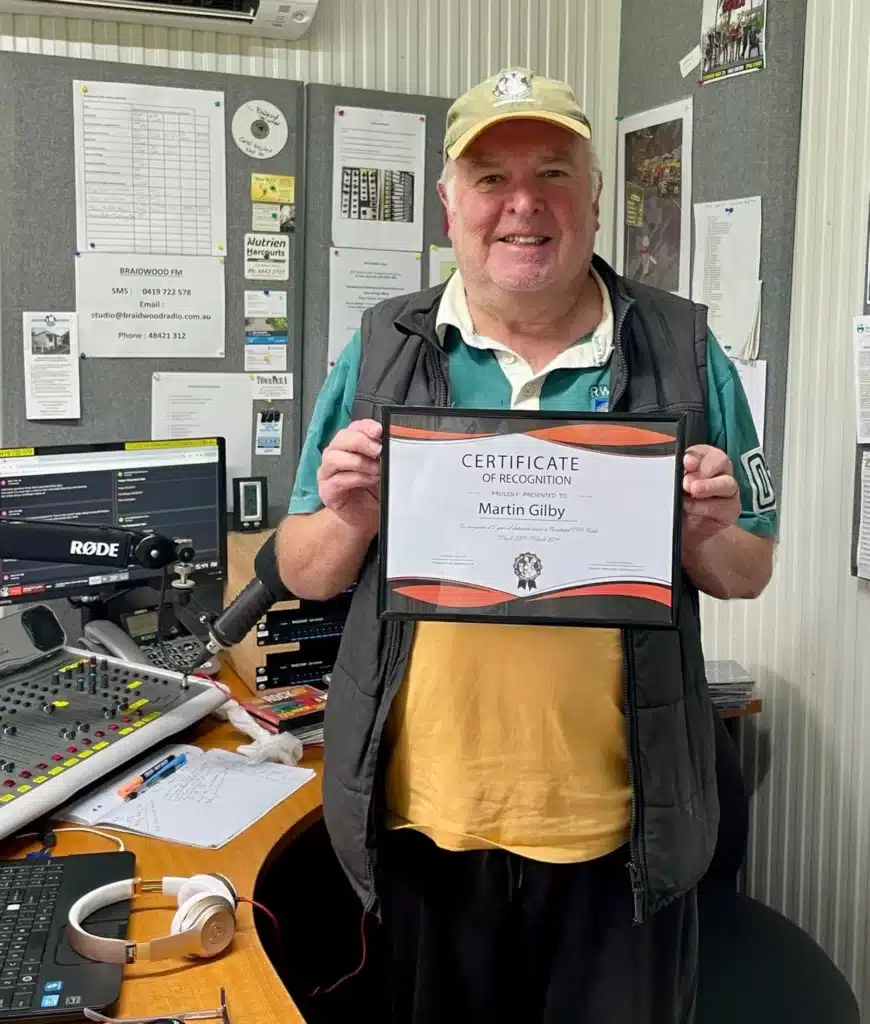Braidwood FM’s team of volunteers kept calm and on the air for days as fires threatened the region
Written by Gordon Waters on December 22, 2019
The Braidwood community radio station, Braidwood FM, known affectionately as the Barbed Wireless, had only just expanded its transmission range when fires threatened the town of about 1650 people.

At first none of the station’s volunteers quite understood the challenge.
As the town first faced a rapidly changing fire late in November, the community turned to calm and knowledgeable voices coming over the radio from a small studio overlooking the town’s golf course. It kicked off 14 days of near continuous coverage of the Tallaganda National Park fire.
This volunteer team, none of whom were experienced emergency broadcasters, put updates from the Rural Fire Service to air hour after hour, took calls and relayed some of the best local knowledge to nervous landholders and residents. The station became a direct line of contact between locals and the RFS.
“I then started to drag people in because I realised we were going to be here for a while,” Mr Waters said.
“And I did a fair bit to start with and then this is where everyone else came in and picked it up and we just ran with it.”
Station president, Rod McClure, who also joined the team behind the microphone for the marathon on air stints, said the transmitter’s new range meant it reached areas that had never had radio before.
“But I’ve said to a few people that never in our wildest dreams did we think it would be a fire like this.
“We could sit here on the Friday and Saturday night, couldn’t we, and look out and see the firies’ lights on the roads out there and watch the DC 10 come in and drop fire retardant on Mount Gillamatong,” he said.
The experience had been tough and draining, but what the team had learned would inform a plan for next time.
“As for a plan red, we’ll be writing one because we’ve learned so much. We learned not necessarily to take what a local person says unless you’re absolutely sure about it,” Mr McClure said.
“That’s why very early on we had Phil on the hill, Matt on the flat, Vera in the village and they could be relied on to give us pretty good information, and even then we generally waited the hour until we had confirmation from RFS.”
Station vice president, Bill McGinnis, provided support and a constant helping hand on the broadcast, taking calls and keeping the program on air, while Gavin Pillage phoned in with updates from his mail delivery van as he crossed through the landscape.
“Gordon and Rod, they know this place like the back of their hand. When I was involved, I just kind of backed up and threw some music in and kind of helped to fill the programming. I haven’t lived here long enough to know. Gordon would say, ‘Is that right near the stop sign or the first house on the right?’,” Mr McGinnis said.
Mr Waters said knowing the area helped him ask the right questions and helped to reassure the listeners.
“[It] meant the people in the fire area listening thought, ‘he knows where we are, he knows we live here, he knows we’re two kilometres from the water well.’ So the questions I then posed in the updates were very localised … [and] people listening soon realised that, ‘look, these guys are actually asking the questions we want asked’,” he said.
There were plenty of challenges in the small studio. Laptops, maps and phones were splayed out across the desk, while people dived under it to answer calls and not be heard on air. Conflicting information caused the biggest headaches.
“[RFS spokesman] Darren [Marks] is talking about Sheep Station Creek and all of a sudden we get this panicked phone call from this place called Sawyers Ridge Road. And they’re going, ‘where’s the fire? Where’s the fire? What’s going on?’
“Well there happened to be two Sheep Station Creeks within about 10 kilometres of each other,” Mr McClure said.
“There’s now actually a third,” Mr Waters said. “There’s one out the Nerriga way.”
It did not take long for the town and the surrounding community to rely on Braidwood FM’s coverage, which for some was the only source of information. Portable, battery powered radios sold out in town. The local school prepared a big thank-you poster for the station.
“Probably for Bill and me the most emotional moment – it was emotional for us – was a lady came in while we were on air, and she sat down and patiently waited. When we went off air she said, ‘I’ve just come to tell you that you’ve saved my life’,” Mr McClure said.
“We just didn’t know what to say. She had this huge basket of Christmas type stuff and she said, ‘I was in Braidwood but I’m widowed, I was scared and I’ve got a sister over in Farringdon. And I knew by listening that she was OK and that the odds were that we were going to be OK.’
“To her, that’s how she put it. And I don’t think we literally did that at all, but in her mind’s eye, the information and the calmness really, really helped her.”
Article from the Canberra Times.





 Braidwood FM
Braidwood FM